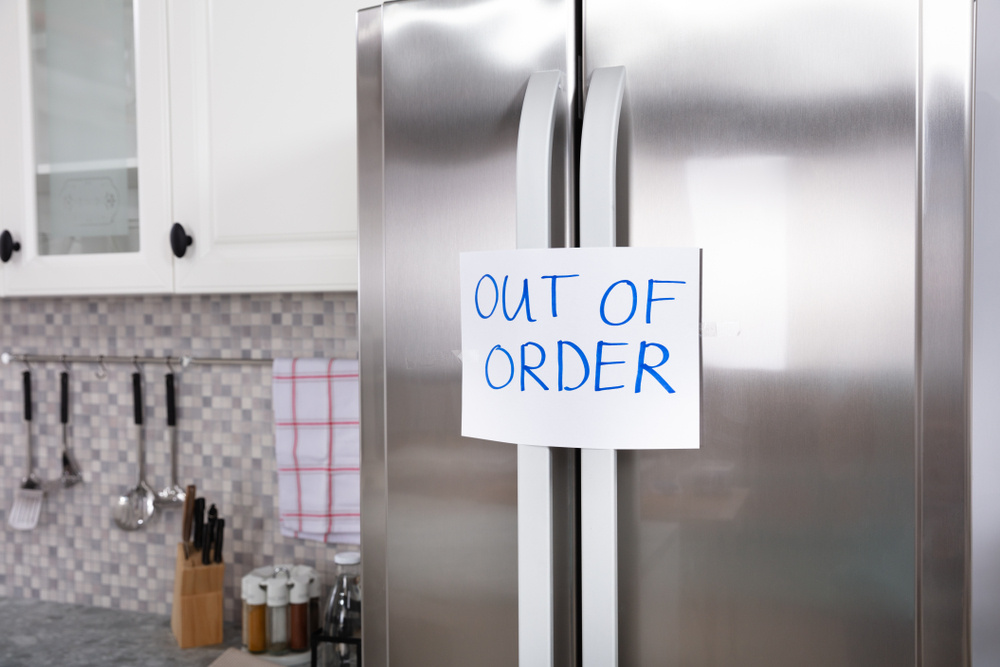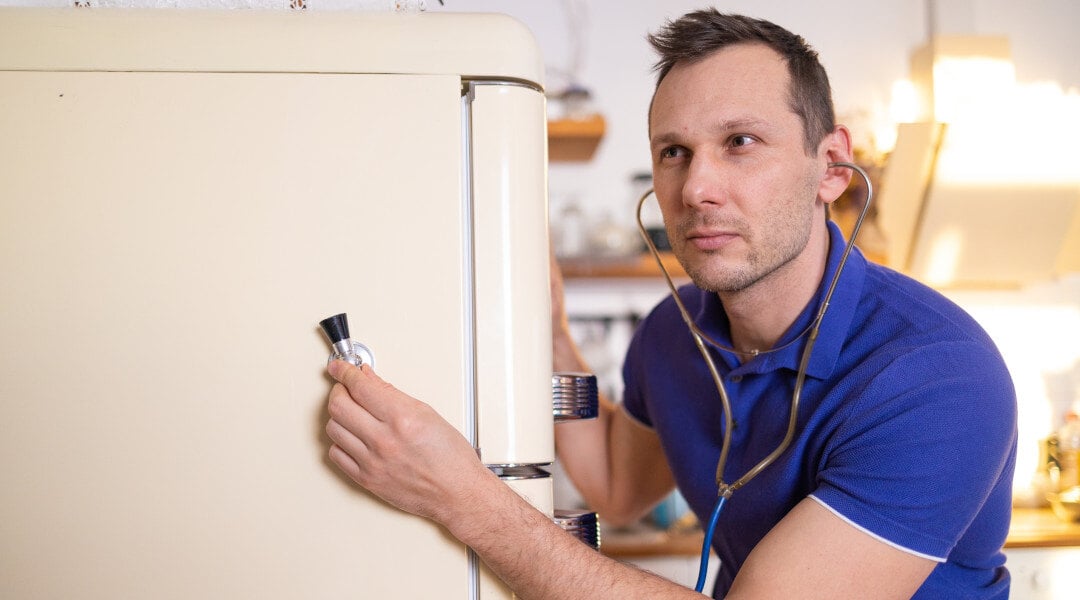Fixing a broken fridge can be a real headache for homeowners. The cost of refrigerator repair can vary a lot, usually between $300 and $1,000. This wide range depends on what's wrong with your fridge and who you hire to fix it. Many people worry about high repair bills, but knowing what to expect can help you plan better. In this article, we'll break down the costs of fridge repair and give you some tips to save money.
Sign up for our Blog!
Understanding Refrigerator Repair Costs
When your fridge stops working, the first thing you'll want to know is how much it'll cost to fix. The price tag can change based on a few key factors:
Diagnostic Fee
Most repair companies charge a diagnostic fee to figure out what's wrong with your fridge. This fee usually runs between $50 and $150. The good news is that many places will take this fee off your final bill if you choose them to do the repair.
Labor Costs
The biggest part of your repair bill will likely be labor costs. Repair technicians usually charge by the hour, with rates ranging from $45 to $120 per hour. How long the repair takes depends on what's wrong with your fridge.
Parts Costs
Sometimes, your fridge might need new parts. The cost of these parts can vary a lot. For example, a new door seal might only cost $100, while a new compressor could set you back $650 or more.

Common Refrigerator Problems and Their Costs
Different fridge problems come with different price tags. Here are some common issues and what you might expect to pay:
Compressor Issues
The compressor is like the heart of your fridge. If it breaks, it's one of the most expensive parts to replace. Fixing a compressor can cost anywhere from $200 to $650.
Thermostat Problems
If your fridge isn't staying cold, it might be a thermostat issue. Replacing a thermostat usually costs between $150 and $400.
Refrigerant Leaks
Leaking refrigerant can cause your fridge to warm up. Fixing a refrigerant leak typically costs between $100 and $440.
Ice Maker Repairs
If your ice maker stops working, repairs usually cost between $200 and $350.
Factors That Affect Repair Costs
Several things can change how much you'll pay for fridge repair:
Brand and Model
Some brands are more expensive to repair than others. Fancy fridges with special features often cost more to fix.
Age of the Refrigerator
Older fridges might need more repairs and could be harder to find parts for, which can drive up costs.
Location
Where you live can affect repair costs. Prices tend to be higher in big cities compared to small towns.
Repair Company
Different repair companies charge different rates. It's a good idea to get quotes from a few places before deciding.

Tips to Save Money on Refrigerator Repairs
No one wants to spend more than they have to on fridge repairs. Here are some ways to keep costs down:
- Regular maintenance can prevent big problems.
- Clean the coils behind your fridge every six months.
- Check if your fridge is still under warranty before paying for repairs.
- Get multiple quotes from different repair companies.
- Ask if there's a service fee and if it's included in the repair cost.
When to Repair vs. When to Replace
Sometimes, it might be better to buy a new fridge instead of repairing an old one. Here's a quick guide:
- If the repair costs more than half the price of a new fridge, consider replacing it.
- If your fridge is more than 10-15 years old, it might be time for a new one.
- If you're having frequent problems, a new fridge could save you money in the long run.
Remember, taking care of your fridge can help it last longer and save you money on repairs. Regular cleaning and maintenance can go a long way in keeping your fridge running smoothly.
Choosing the Right Repair Service for Your Fridge
When your fridge breaks down, finding the right repair service can be tricky. You want someone who knows what they're doing and won't charge too much. Let's look at how to pick a good repair service and what you should expect.
Finding Reliable Repair Services
The first step in getting your fridge fixed is finding a trustworthy repair service. You can start by asking friends and family if they know any good technicians. People you trust often have good advice. Another option is to check online reviews. Look for repair services with lots of positive feedback from happy customers.
It's also smart to check if the repair service is certified to work on your brand of fridge. Many big fridge makers have lists of approved technicians. These technicians have special training to fix that brand's fridges. Using a certified technician can be a good way to make sure the job is done right.
Understanding Repair Costs
Fridge repair costs can vary a lot. The price depends on what's wrong with your fridge and how old it is. Most repairs cost between $200 and $400. But if something big like the compressor needs fixing, it could cost up to $650 or more.
When you call a repair service, they'll usually charge a fee just to come look at your fridge. This is called a diagnostic fee. It usually costs between $50 and $100. Many repair services will take this fee off your bill if you choose to have them fix your fridge.
What to Expect During the Repair Process
When the technician arrives, they'll first check your fridge to see what's wrong. They might ask you questions about when you first noticed the problem. Be ready to tell them about any strange noises, leaks, or temperature changes you've seen.
After figuring out the problem, the technician should give you an estimate of how much the repair will cost. They should explain what needs to be fixed and why. Don't be afraid to ask questions if you don't understand something.
Most fridge repairs take a few hours at most. But if the technician needs to order a part, it might take a day or two to get your fridge fixed. The technician should tell you how long they expect the repair to take.
Tips for a Smooth Repair Experience
To make sure your fridge repair goes well, here are some helpful tips:
- Clear the area around your fridge before the technician arrives.
- Write down any problems you've noticed with your fridge.
- Ask the technician for advice on how to keep your fridge running well.
- Get the estimate in writing before agreeing to any repairs.
When to Repair vs. When to Replace
Sometimes, it might make more sense to buy a new fridge instead of repairing your old one. If your fridge is more than 10 years old and the repair will cost more than half the price of a new fridge, it might be time to replace it.
New fridges are often more energy-efficient, which can save you money on your electric bill. They also come with warranties, which can give you peace of mind.
Preventing Future Fridge Problems
After your fridge is fixed, you'll want to keep it running smoothly. Here are some easy ways to prevent future problems:
- Clean the coils behind or under your fridge every six months.
- Check the door seals to make sure they're clean and tight.
- Don't overload your fridge. Too much stuff can make it work harder.
- Keep the temperature set between 37 and 40 degrees Fahrenheit.
By taking good care of your fridge, you can avoid many common problems and keep it running well for years to come.
Remember, a well-maintained fridge not only keeps your food fresh but can also save you money in the long run. Regular check-ups and quick action when you notice problems can help you avoid big, expensive repairs.
Common Fridge Issues and DIY Solutions
When your fridge acts up, it can be stressful. But not every problem needs a pro. Let's look at some common fridge issues you might be able to fix yourself.
Fridge Not Cooling Properly
One of the most common complaints is a fridge that's not cold enough. Before you panic, check a few things. First, make sure the fridge is plugged in and the power is on. It sounds simple, but sometimes a loose plug is all it takes to cause problems.
Next, check the temperature settings. Sometimes, they get bumped by accident. The fridge should be set between 37 and 40 degrees Fahrenheit. If it's warmer than that, adjust the dial and wait a few hours to see if it helps.
If the settings are correct, look at the condenser coils. These are usually at the back of the fridge or underneath it. When they get dusty, the fridge has to work harder to stay cool. Cleaning them with a vacuum or brush can make a big difference.
Ice Maker Not Working
Ice makers can be tricky. If yours isn't making ice, first check if it's turned on. There's usually a switch or lever that controls it. Also, make sure the water line to the fridge isn't kinked or frozen.
If everything looks good but you're still not getting ice, the water filter might be clogged. Most fridges have a filter that needs changing every six months. A new filter can often fix ice maker problems.
Strange Noises
Fridges make some noise, but loud or unusual sounds can mean trouble. A buzzing or humming that's louder than normal could mean the compressor is working too hard. This might happen if the fridge is overfull or if the door seals are loose.
Rattling noises often come from loose parts. Check if anything in the fridge or freezer is vibrating. Sometimes, just moving things around can stop the noise.
Water Leaking on the Floor
Finding a puddle of water by your fridge is never fun. Often, this happens because the defrost drain is clogged. The drain is usually at the back of the freezer. You can try to clear it with warm water or a pipe cleaner.
Another common cause of leaks is a clogged or frozen water line for the ice maker. If you can get to it, check if the line feels frozen. You can try thawing it with a hair dryer, but be careful not to overdo it.
Fridge Running All the Time
If your fridge never seems to stop running, it might be working too hard. This can happen if the door seals are dirty or damaged. Clean the seals with warm, soapy water and check for any cracks or tears. If they're damaged, you might need to replace them.
The temperature in your kitchen can also affect how hard your fridge works. If it's very hot in the room, the fridge will run more often. Try to keep the area around your fridge cool and give it some space to breathe.
When to Call a Pro
While these DIY fixes can solve many problems, some issues need expert help. If you've tried these tips and your fridge still isn't working right, it's time to call a professional. Also, if you smell burning or see any sparks, unplug the fridge right away and get help. Safety should always come first.
Remember, regular cleaning and maintenance can prevent many fridge problems. Keeping the coils clean, changing filters on time, and not overloading your fridge can help it run better and last longer.
Conclusion
At OnPoint, we understand how important a working fridge is to your daily life. We've shared these DIY tips to help you tackle common fridge issues quickly and easily. Our team of experienced professionals is always ready to help with more complex problems. We offer comprehensive coverage and innovative programs designed to keep your home appliances running smoothly. Whether you're a homeowner or a property manager, we're here to provide superior customer service and expert solutions. If you're facing a fridge issue you can't solve, or if you want to learn more about our services, don't hesitate to take a look at our home warranty plans. We're committed to keeping your home running smoothly, one appliance at a time.





.jpg)
.jpg)


.jpg)

